朗文小学英语4a第一课
最新香港朗文小学英文教材 Primary Longman Elect 4A WordList

嗜好,爱好,兴趣 收集 贴纸 邮票 报纸 杂志 漫画书 溜冰 游泳 骑单车 计算机 钢琴 小提琴 足球 篮球 经常,一直总是 时常 有时 很少 从不 慢跑 散步 和朋友玩 洗澡 刷牙 打扫房间 做拼图 世界 网站 上网 周末 宁愿 沉闷,枯燥 空余时间 寻找 相同的 聊天 地址 电话号码 多久 兴趣班 吃点心 骑自行车 画画
30.hard-working
Chapter4
1. dishes
2. tuna 3. prawn 4. salad 5. spaghetti 6. macaroni 7. mushrooms 8. soup
打羽毛球 做饼干
罐子 花生酱 果酱 酒吧 巧克力 一条面包 贵的 便宜的 令人厌恶的 美味的 流行的 选择 恐龙 反而;代替
香港小学英文教材
Chapter 1 1. hobbies 2. collecting 3. stickers 4. stamps 5. newspaper 6. magazines 7. comics 8. ice-skating 9. swimming 10. cycling 11. computer 12. piano 13. violin 14. football 15. basketball 16. always 17. often 18. sometimes 19. seldom 20. never 21. jogging 22. go for a walk 23. play with my friends 24. have a bath 25. brush teeth 26. tidy the room 27. do puzzles 28. world 29. website 30. surf the Net 31. weekend 32. prefer 33. boring 34. spare time 35. look for 36. same 37. chat 38. address 39. phone number 40. how long 41. interest class
香港朗文WTE 4A Chapter1 词汇 语法 知识点

4A Chapter1 背诵内容一.单词部分n.名词v.动词vt. 及物动词vi.不及动词pron. 代词prep. 介词adj. 形容词adv. 副词conj. 连词num. 数词art. 冠词interj.感叹词Part I.1.activity [ækˈtɪvətɪ] n. 活动2.spare [speə] adj. 空余的,空闲的3.roller-skate ['rəʊləˌskeɪt] vi./n. 滚轴溜冰; 滚轴溜冰鞋4.jog [dʒɒg] vi. 慢跑5.too [tu:] adv. 太;也6.either [ˈaɪðə] adv./pron. 也(否定句);(两者中)任何一个7.reply [rɪˈplaɪ] vt./vi. 回答Part II. Past form(过去式)walk—walked ask—asked reply—replied say—said draw-drew be—was/were think—thought go—went get—gotPart III. Gerund (动名词)swim—swimming jog—jogging roller-skate—roller-skating dance—dancing paint—painting listen—listening二.词组部分1.in one’s spare time在某人的空余时间2.listen to (the) music 听音乐3.play chess 下棋4.like/love/enjoy doing 喜欢干某事5.go swimming (去)游泳6.go jogging (去)慢跑7.go roller-skating (去)溜冰8.make a new friend named Tom 交了一个叫汤姆的朋友9.in fact=as a matter of fact= actually 事实上10.i n the gym 在体育馆11.i n the fitness club 在健身俱乐部12.i ndoor stadium 室内体育馆13.d ance flamingo 跳弗莱明哥14.p erform ballet 跳芭蕾15.f inish doing 完成某事/干某事16.p ractise sth./doing 练习某事/干某事17.b e good at sth./doing 擅长于某事/干某事18.b e poor at sth./doing 不擅长于某事/干某事19.b e interested in sth./doing 对干某事/干某事感兴趣20.b e afraid of sth./doing 害怕某事/干某事21.a detective story called Conan 一个叫作《科南》的侦探故事22.o ne of the most famous artists 著名的画家之一(一位著名的画家)23.a t the weekend/at weekends/on the weekend 在周末24.a middle-aged woman 一位中年妇女25.o n weekdays 在工作日,平日26.b e busy with sth. 忙于某事27.b e busy doing 忙于干某事28.b e important to sb. 对某人而言是重要的29.e njoy the fresh air and the beautiful moments 享受新鲜的空气与美妙的时光30.e njoy oneself= have a good time 某人玩得很开心31.a family helper 一位家庭帮手32.s end and pick up kids 接送小孩33.p lay the piano/violin 弹钢琴,拉小提琴(西洋乐器名词前加the )34.p lay Erhu 拉二胡(民族乐器前无the)35.p lay table tennis 打羽毛球(球类名词前无the)36.p lay on the swings/slide 在秋千(滑滑梯)上玩37.p lay with sb. 与某人一起玩38.p lay with sth. 玩耍某物39.a bit later 一会儿以后40.w alk away sadly 难过地走开了41.w alk the dog 溜狗42.w alk home=go home on foot 走回家43.g o home =go back home 回家44.g et home=arrive home 到家45.a fter that 在那以后46.t he black notes (钢琴上)黑键47.s ee sb. doing 看到某人在干某事(强调片断)三.句子部分Part I.1.What do you like doing? 你喜欢干什么?2.I like doing…,too/as well. 我也喜欢做某事。
香港朗文小学英语1A_4B教材教学内容
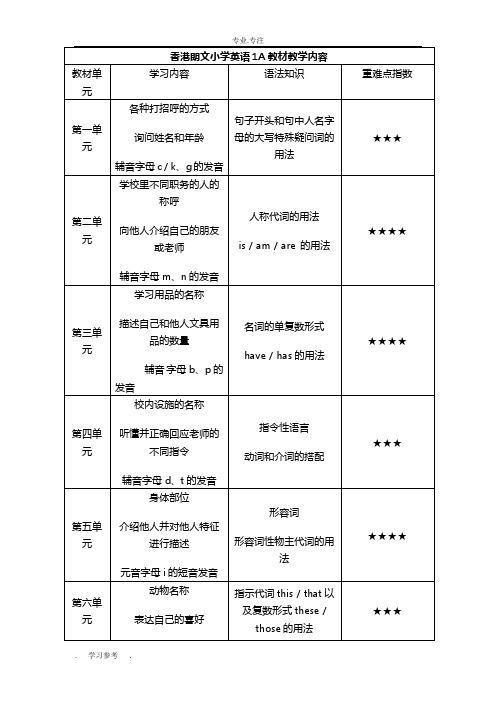
代词Some,all的用法
★★★
第五单元
常见动作及其现在分词形式
询问并回答某人正在做什么
辅音字母l、r的发音
现在进行时态
复习人称代词
★★★★★
第六单元
更多常见动作及其现在分词形式
表达不同人正在做不同的事情
辅音字母w和字母组合wh的发音
巩固复习现在进行时态
复习介词
★★★★★
第三人称单数的一般疑问句和陈述句
字母组合ay的发音
一般现在时
一般现在时和现在进行时的区别
★★★★★
第二单元
表示行为规范的单词
星期的全称和缩写形式
字母组合th的清辅音发音
第三人称单数的肯定句和否定句
第三人称单数动词的变化规则
★★★★★
第三单元
交通工具名称
用不同的特殊疑问词提问
字母组合tr / dr的发音
教材单元
学习内容
语法知识
重难点指数
第一单元
常见玩具名称
对物品的颜色进行描述
元音字母e的短音发音
连词and的用法
It is与They are的用法
复习is / are & have / has
★★★★★
第二单元
各类衣服的名称
询问和表达某物是某人的
字母s以及字母组合sh的发音
名词所有格
Is this 与Are these的用法
★★★★
第三单元
学习用品的名称
描述自己和他人文具用品的数量
辅音字母b、p的发音
名词的单复数形式
have / has的用法
★★★★
第四单元
校内设施的名称
最新香港朗文小学英文教材 Primary Longman Elect 4A WordList

Chapter 1Chapter 21.hobbies嗜好,爱好,兴趣2.collecting收集 1.small小的3.stickers贴纸 2.big大的4.stamps邮票 3.short短,矮的5.newspaper报纸 4.tall高的6.magazines杂志 5.thin瘦的ics漫画书 6.fat胖的8.ice-skating溜冰7.light轻的9.swimming游泳8.heavy重的10.cycling骑单车9.young年经的puter计算机10.old年老的12.piano钢琴rge巨大的13.violin小提琴12.nice漂亮的14.football足球13.funny有趣的15.basketball篮球14.naughty淘气的16.always经常,一直总是15.pretty漂亮的17.often时常zy懒惰的18.sometimes有时17.slow缓慢的19.seldom很少18.fast快速的20.never从不19.different不同的21.jogging慢跑20.enjoy享受22.go for a walk散步21.in the middle在中间23.play with my friends和朋友玩22.send发送24.have a bath洗澡23.kid孩子25.brush teeth刷牙24.height高度26.tidy the room打扫房间25.joke玩笑27.do puzzles做拼图26.twins双胞胎28.world世界27.fold the clothes叠衣服29.website网站28.tired疲倦的30.surf the Net上网29.go hiking去远足31.weekend周末 30.hot炎热的32.prefer宁愿Chapter333.boring沉闷,枯燥34.spare time空余时间 1.bunch束35.look for寻找 2.grapes葡萄36.same相同的 3.bananas香蕉37.chat聊天 4.packet包,包装袋38.address地址 5.plum葡萄干; 李子39.phone number电话号码 6.sour酸的40.how long多久7.potato chips薯条41.interest class兴趣班8.carton卡通42.have snacks吃点心9.soya milk豆乳43.ride a bicycle骑自行车10.blackcurrant黑醋栗44.paint pictures画画11.tin罐头盒;45.play badminton打羽毛球12.nuts坚果46.make biscuits做饼干13. sausages香肠Chapter4Chapter3 1.beef牛肉1.jar罐子2.curry咖喱2.peanut butter花生酱3.Indian印度的3.jam果酱4.Japanese日本的,日本人4.bar酒吧5.Italian意大利的,意大利人5.chocolate巧克力6.news新闻6.loaf一条面包7.win获胜,赢7.expensive贵的8.first prize一等奖8.cheap便宜的9.celebrate庆祝9.disgusting令人厌恶的10.enter入口,进入10.delicious美味的11.exit出口11.popular流行的12.menu菜单12.choose选择13.sushi寿司13.dinosaur恐龙14.crab stick蟹棒14.instead反而;代替15.pasta面团15.upset沮丧的;难过的;失望的16.quickly迅速地,立即16.point at(把…)对准,指向;17.tray托盘17.pick up捡起;接载18.cockroach蟑螂18.throw away扔掉19.worst最差的19.win获胜,赢20.pudding布丁20.leave离开;遗弃21.change改变;零钱21.shopping bag购物袋22.dialogue对话22.in the end最后23.wrong错误的23.change改变;零钱24.tissue组织,薄纸,一套24.how many多少25.price价格Chapter526.polite有礼貌的27.helpful给予帮助的 1.place地方28.beautiful美丽的 2.supermarket超市29.dry干燥的 3.shopping center购物中心30.hard-working勤勉的,努力工作的 4.airport飞机场5.theme park主题公园Chapter4 6.electronic电子的7.product产品1.dishes盘子( dish的名词复数 )8.mobile phone移动电话2.tuna金枪鱼9.DVD player DVD播放机3.prawn对虾10.digital camera数码像机4.salad沙拉11.everybody每个人5.spaghetti意大利面12.nobody没人6.macaroni通心粉13.famous著名的7.mushrooms蘑菇14.blog博客8.soup汤15.video视频9.noodles面条16.weblink链接10.dumplings饺子17.born出生11.pork chop猪排18.hut小屋12.chicken鸡肉19.outside外面Chapter5 Chapter620.flat平的 1.practise练习21.market市场 2.hard坚硬的,困难的,努力的22.fresh新鲜的 3.right正确的,右手1.little小的 4.left左边2.lucky幸运的 5.similar相似的;3.life生活 6.exciting令人兴奋的4.ago在。
香港朗文小学英语教材
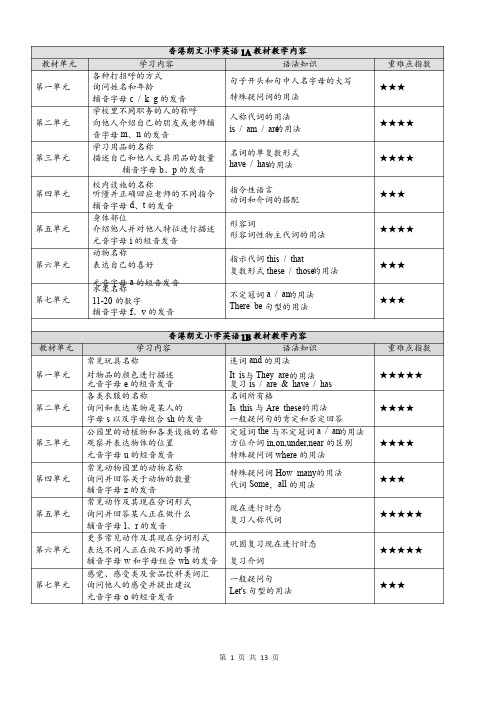
香港朗文小学英语1A教材教学内容教材单元学习内容语法知识重难点指数第一单元各种打招呼的方式询问姓名和年龄辅音字母c / k、g的发音句子开头和句中人名字母的大写特殊疑问词的用法★★★第二单元学校里不同职务的人的称呼向他人介绍自己的朋友或老师辅音字母m、n的发音人称代词的用法is / am / are 的用法★★★★第三单元学习用品的名称描述自己和他人文具用品的数量辅音字母b、p的发音名词的单复数形式have / has的用法★★★★第四单元校内设施的名称听懂并正确回应老师的不同指令辅音字母d、t的发音指令性语言动词和介词的搭配★★★第五单元身体部位介绍他人并对他人特征进行描述元音字母i的短音发音形容词形容词性物主代词的用法★★★★第六单元动物名称表达自己的喜好元音字母a的短音发音指示代词this / that 复数形式these / those的用法★★★第七单元水果名称11-20的数字辅音字母f、v的发音不定冠词a / an的用法There be 句型的用法★★★香港朗文小学英语1B教材教学内容教材单元学习内容语法知识重难点指数第一单元常见玩具名称对物品的颜色进行描述元音字母e的短音发音连词and的用法It is与They are的用法复习is / are & have / has ★★★★★第二单元各类衣服的名称询问和表达某物是某人的字母s以及字母组合sh的发音名词所有格Is this 与Are these的用法一般疑问句的肯定和否定回答★★★★第三单元公园里的动植物和各类设施的名称观察并表达物体的位置元音字母u的短音发音定冠词the与不定冠词a / an的用法方位介词in,on,under,near的区别特殊疑问词where的用法★★★★第四单元常见动物园里的动物名称询问并回答关于动物的数量辅音字母z的发音特殊疑问词How many的用法代词Some,all的用法★★★第五单元常见动作及其现在分词形式询问并回答某人正在做什么辅音字母l、r的发音现在进行时态复习人称代词★★★★★第六单元更多常见动作及其现在分词形式表达不同人正在做不同的事情辅音字母w和字母组合wh的发音巩固复习现在进行时态复习介词★★★★★第七单元感觉、感受类及食品饮料类词汇询问他人的感受并提出建议元音字母o的短音发音一般疑问句Let's句型的用法★★★香港朗文小学英语2A教材教学内容教材单元学习内容语法知识重难点指数第一单元常见公众地点的名称公共场合标志牌的介绍字母组合ar的发音祈使句的肯定和否定表达动词短语★★★★★★第二单元发生在公共场合的动词和动词短语公众场合的行为举止要求字母组合a_e的发音情态动词must / mustn’t的用法介词at,on,in的用法★★★★★★第三单元常见食物名称区分可数与不可数名词字母j和字母组合ch的发音可数与不可数名词There be 句型一般疑问句以及肯定和否定回答★★★★★★★★第四单元更多食品类名称询问和表达对食品的喜爱字母组合i_e的发音Do you like.../ Would you like...的用法and / or 的用法的用法★★★★★★第五单元不同商店的名称商场文化以及楼层表达的文化差异字母组合ea / ee的发音Is there引导的一般疑问句以及回答序数词★★★★★★第六单元常见的公共、购物、娱乐等场所名称询问和告知某地点的具体位置辅音字母c在e/i/y 和a/o/u前的不同发音更多的方位介词询问和指明方向★★★★★★第七单元常见的动物名称对事物的外形和特点进行描述字母组合o_e的发音第三人称单数表示事物特征的形容词复习have / has的用法★★★★★★★★★★香港朗文小学英语2B教材教学内容教材单元学习内容语法知识重难点指数第一单元日常家务劳动的动词短语第三人称单数的一般疑问句和陈述句字母组合ay的发音一般现在时一般现在时和现在进行时的区别★★★★★★★★★★第二单元表示行为规范的单词星期的全称和缩写形式字母组合th的清辅音发音第三人称单数的肯定句和否定句第三人称单数动词的变化规则★★★★★★★★★★第三单元交通工具名称用不同的特殊疑问词提问字母组合tr / dr的发音的发音复习where / how / what等特殊疑词的用法区分介词on in by的用法★★★★★★★★第四单元职业名称询问和表达家庭成员的职业字母组合th的浊辅音发音Do / does 的用法的用法How many / How的用法and / or的用法的用法★★★★★★★★★★第五单元关于课外活动的动词短语询问和表达日常的活动安排字母组合cr / gr 的发音的发音What do / does ...的用法根据答句写问句巩固复习方位介词★★★★★★★★★★第六单元一天中经历的不同活动的动词词组询问他人作息与活动的时间安排字母组合or 的发音,并对比元音o的发音What / What time的区别的区别介词in at的用法★★★★★★第七单元与季节和天气相关的形容词更多的衣物名称字母组合oa / ow的发音形容词介词in的用法★★★★★★香港朗文小学英语3A教材教学内容教材单元学习内容语法知识重难点指数第一单元学习月份和日期的表达对节日或活动的时间进行提问基数词和序数词表示不同时间的介词in / on / from…to…★★★★★★★★第二单元关于业余爱好的动词和动词短语询问和表达个人和他人的业余爱好的字母组合ng的发音like + -ing的用法一般现在时的第三人称复习介词的用法★★★★★★★★★★第三单元运动类的动词短语询问和表达个人和他人某方面的能力字母组合oi / oy的发音情态动词can / can't的用法的用法连词and / or / but的用法★★★★★★第四单元户外活动的动词短语询问和表达户外活动意愿字母组合nt / nd的发音Where & What的用法的用法want to的用法巩固复习情态动词、助动词和系动词★★★★★★第五单元常见的零食和点心名称对价格进行提问和回答字母组合er的发音食物类不可数名词的数量表达How much的用法★★★★★★第六单元日常衣物类名称选择自己想要的物品字母组合tr / tw的发音百以上的数字表达How much & How many的区别Which one(s)的用法★★★★★★★★第七单元日常生活用品名称对物品的特征和位置进行描述字母组合sm / sw的发音感官动词it/ them的用法介词的复习★★★★★★★★香港朗文小学英语3B教材教学内容教材单元学习内容语法知识重难点指数第一单元日常生活中应该做和不应该做的事表达自己对某件事情赞同或反人称代词的主格和宾格在句子中的指代和使用★★★★★★★★第二单元学校各学科的名称表达自己喜欢的学科和擅长做的事描述班级中各个同学所坐的位置字母组合oom的发音方位介词be good at的用法的用法★★★★★★★★第三单元蔬菜和调味料的名称询问和表达食物的存在状态字母y的发音There be 句型的肯、否定和疑问形式some / a lot of的区别any的用法★★★★★★★★★★第四单元常见菜肴的英文表达对某种菜的味道进行提问并回答字母组合all的发音What do / does的用法的用法too / either 的用法的用法★★★★★★★★第五单元一些描述简单动作的动词描述学校活动内容和结果字母组合st的发音一般过去时态Be动词am, is, are的过去式规则动词的过去式形式★★★★★★★★★★第六单元一些可以作为礼物的物品名称关于生日主题的对话字母组合ew的发音不规则动词的过去式形式一般过去时的特殊疑问句形式人称代词宾格的搭配使用★★★★★★★★★★第七单元中西方节日名称了解各个节日对应的活动字母组合gh的发音一般过去时的一般疑问句What / Where / How many的用法介词at on in的区别和用法★★★★★★★★★★香港朗文小学英语4A教材教学内容教材单元学习内容语法知识重难点指数第一单元向朋友作自我介绍的基本信息(姓名、电话、住址、爱好、生日、e-mail等)各类特殊疑问词的不同用法关于住址的表达和信封写★★★★★★法的中西方文化差异第二单元同学朋友之间外貌特征、性格爱好的对比相同点和不同点的比较形容词的规则比较级变化及运用★★★★★★★★★★第三单元一些常见食品的名称对食物的口味、价格、受欢迎程度、是否健康等方面进行比较不可数名词的数量表达多音节形容词的比较级★★★★★★★★★★第四单元拓展食物的名称和类别学会礼貌的选择食物及表达食物的口味选择疑问句What / Which的用法★★★★★★第五单元表示人物性格特征的形容词对身边人的性格特征进行描述形容词的最高级变化规则及运用★★★★★★★★★★第六单元业余时间里开展的活动名称表达各种活动开展的频率形容词不规则的比较级变化频度副词★★★★★★★★★★第七单元一些表示日常生活行为的动词短语回忆小时候会做的和不会做的事情when引导的时间状语从句反身代词的意义与用法★★★★★★★★第八单元学习一些以前的物品和游戏名称将几十年前的生活状况和现在进行对比Was / there & Did的用法Anybody / Nobody / Everybody的用法★★★★★★★★★★香港朗文小学英语4B教材教学内容教材单元学习内容语法知识难度指数第一单元了解卡通电影文化询问对电影的喜欢程度,并对看过的电影进行比较程度副词形容词比较级一般过去式★★★★★★★★★★第二单元各类型电视节目名称了解各人群看电视的习惯、类型和原因but / or / both的用法Why / because的用法★★★★★★★★第三单元了解香港旅游文化关于旅游话题的谈论一般将来时态Will的用法★★★★★★★★★★第四单元各类户外设施地点名称准确表达某地点的具体方向和位置walk past / along / across / through的用法★★★★★★★★★★第五单元日常饮食与健康就日常饮食份量多少进行描述与比较形容词性量词与可数、形容词性量词与可数、不可不可数名词的搭配★★★★★★★★第六单元健康饮食的要求提供良好的饮食建议,保持身体健康限定词的使用Too much / too many与可数、不可数名词的搭配★★★★★★★★第七单元培养学生良好的生活习惯谈论生活习惯并对他人生活习惯提出建议频率副词情态动词★★★★★★★★第八单元培养学生良好的作息习惯谈论做好计划所带来的好结果be + going to的意义与用法的意义与用法will (be) / won't (be)的用法★★★★★★★★★★香港朗文版小学英语教材各册目录(武汉深圳广州等外国语学校专用教材)香港朗文版小学英语1A Chapter 1 Starting school Chapter 2 Nice to meet you! Chapter 3 My toys Chapter 4 My pencil case Chapter 5 We can do it! Chapter 6 Look at me!香港朗文版小学英语1BChapter 1 Choosing a pet Chapter 2 Our pet friends Chapter 3 Wild animals Chapter 4 More about animals Chapter 5 Happy moments Chapter 6 A fashion show香港朗文版小学英语2A Chapter 1 Coming to school Chapter 2 About me Chapter 3 People who help me Chapter 4 People at work Chapter 5 Signs we see Chapter 6 Places in the park香港朗文版小学英语2B Chapter 1 Buying snacks Chapter 2 Our favourite food Chapter 3 My day Chapter 4 Helping at home Chapter 5 Sports we like Chapter 6 Activities we like 香港朗文版小学英语3A Chapter 1 Weather and seasons Chapter 2 Festivals we like Chapter 3 Our school events Chapter 4 At the school fair Chapter 5 Things at home Chapter 6 A trip to the beach 香港朗文版小学英语3B Chapter 1 Open day Chapter 2 Helping others Chapter 3 Camping Chapter 4 In the holidays Chapter 5 Our bodies Chapter 6 When I was young香港朗文版小学英语4A Chapter 1 Knowing our friends Chapter 2 More about our friends Chapter 3 When our grandparents were young Chapter 4 Five hundred years ago Chapter 5 Animals big and small Chapter 6 Wonderful places Chapter 7 Ricky learns a lesson香港朗文版小学英语4BChapter 1 Join our club Chapter 2 Roles in fun places Chapter 3 Holiday plans in Hong Kong Chapter 4 A visit to Hong Kong Chapter 5 Food from around the world Chapter 6 Ordering food Chapter 7 The Choc-a-Rock Banana-Rama Cake 香港朗文版小学英语5AChapter 1 Changes at home Chapter 3 What's the matter? Chapter 4 Lending a hand Chapter 5 Favourite Festivals Chapter 6 A public hoilday Chapter 7 JPC in action香港朗文版小学英语5B Chapter 1 Teamwork Chapter 2 Exciting experiences Chapter 3 Eating habits Chapter 4 Advice on eating Chapter 5 Enjoying nature Chapter 6 Help save the animals Chapter 7 The new Cinderella香港朗文版小学英语6A Chapter 1 When I grow up Chapter 2 My hobbies over the years Chapter 3 Our polluted planet Chapter 4 Help save the earth Chapter 5 Shoppers' paradise Chapter 6 Special people Chapter 7 Can you keep a secret?香港朗文版小学英语6BChapter 1 Study tours Chapter 2 Exploring London Chapter 3 Getting advice Chapter 4 Coping with problems Chapter 5 An interview for a new school Chapter 6 Memories of school life Chapter 7 Our graduation ceremony 。
朗文少儿英语 4A Unit 1 All About US

3. Look at the picture. Read.
4. Write about the picture.
1. The father is__s_ho_r_t_e_r_ than the mother. 2.The sister is___ol_d_e_r__ than the baby. 3.The mother is__t_al_le_r___ than the brother.
bad-worse ... 1.单音节形容词和部分双音节词,一般
在词尾加-er 2.以字母e结尾的词,在词尾直接加-r
表示"比...更"。用比较级形容词+than+比 较成分, than后主词的述语动词往往省略, 非正式用法的than后的人称代名词可用宾 格。
He is younger than me. 他比我年轻。
4.She gets angry when she drops her ice cream.
happy scared angry sad
have fun 玩得开心 hang [hæŋ] vt. 悬挂,垂下
above [ə'bʌv] 在……上面 laught [læf] v.笑;嘲笑 chase [tʃeɪs] vi. 追逐;追赶
monkeys !
Then they go into a building where it is dark.
snake [snek] n. 蛇
Deb sees a big, long snake. She gets scared and jumps.
city['sɪti]
Debcarnaivnadl ['Nkɑranɪnvl]have a goodn. 城ti市me .
(完整word版)朗文小学英语1A-4B教材教学内容
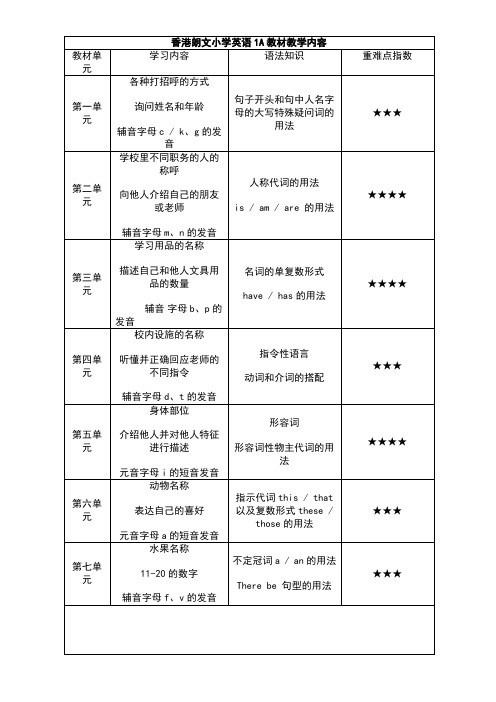
询问对电影的喜欢程度,并对看过的电影进行比较
程度副词
形容词比较级
一般过去式
★★★★★
第二单元
各类型电视节目名称
了解各人群看电视的习惯、类型和原因
but / or / both的用法
Why / because的用法
★★★★
第三单元
了解香港旅游文化
关于旅游话题的谈论
一般将来时态
Will的用法
when引导的时间状语从句
反身代词的意义与用法
★★★★
第八单元
学习一些以前的物品和游戏名称
将几十年前的生活状况和现在进行对比
Was / there & Did的用法
Anybody / Nobody /Everybody的用法
★★★★★
香港朗文小学英语4B教材教学内容
教材单元
学习内容
语法知识
难度指数
第一单元
★★★
第二单元
同学朋友之间外貌特征、性格爱好的对比
相同点和不同点的比较
形容词的规则比较级变化及运用
★★★★★
第三单元
一些常见食品的名称
对食物的口味、价格、受欢迎程度、是否健康等方面进行比较
不可数名词的数量表达
多音节形容词的比较级
★★★★★
第四单元
拓展食物的名称和类别
学会礼貌的选择食物及表达食物的口味
字母组合i_e的发音
Do you like.../ Would you like...的用法
and / or 的用法
★★★
第五单元
不同商店的名称
商场文化以及楼层表达的文化差异
字母组合ea / ee的发音
Is there引导的一般疑问句以及回答
四年级上册英语朗文版第一课课件
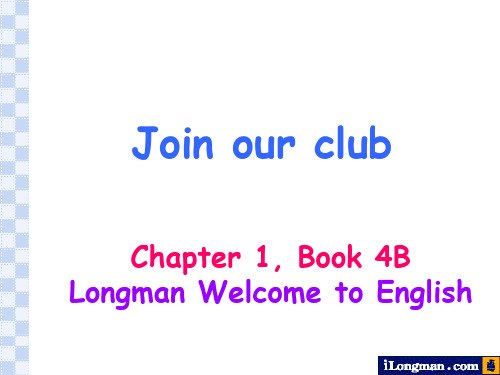
Answer Why do you sweep the graves?
Well done!
A. Because it is Ching Ming Festival. B. Because it is Christmas. C. Because it is Mid-Autumn Festival.
Next stion
We can use because to link up two sentences.
For example:
I was late. I woke up late this morning.
I was late because I woke up late this morning.
* We usually do this in writing.
Try again!
A. Because it is Ching Ming Festival. B. Because it is Christmas. C. Because it is Mid-Autumn Festival.
Why are you laughing?
A. Because I failed the exam. B. Because Jacky told me a joke. C. Because I fell down.
Answer Why are you laughing?
Well done!
A. Because I failed the exam. B. Because Jacky told me a joke. C. Because I fell down.
The End
Answer Why are you laughing?
最新香港朗文4A各单元知识要点 词汇语法
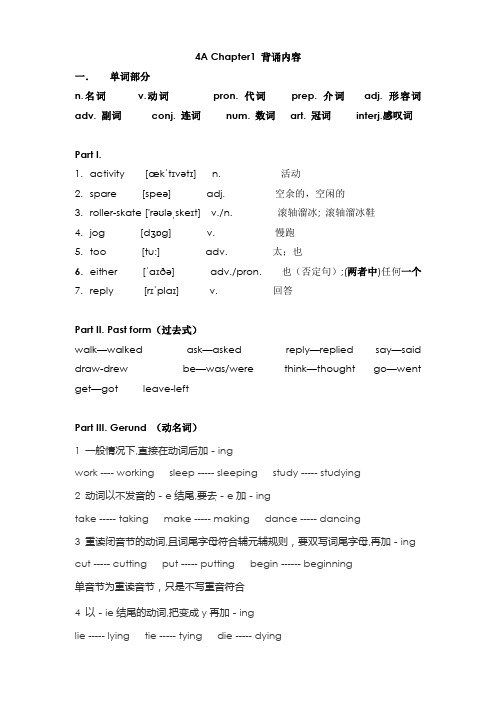
4A Chapter1 背诵内容一.单词部分n.名词v.动词pron. 代词prep. 介词adj. 形容词adv. 副词conj. 连词num. 数词art. 冠词interj.感叹词Part I.1.activity [ækˈtɪvətɪ] n. 活动2.spare [speə] adj. 空余的,空闲的3.roller-skate ['rəʊləˌskeɪt] v./n. 滚轴溜冰; 滚轴溜冰鞋4.jog [dʒɒg] v. 慢跑5.too [tu:] adv. 太;也6.either [ˈaɪðə] adv./pron. 也(否定句);(两者中)任何一个7.reply [rɪˈplaɪ] v. 回答Part II. Past form(过去式)walk—walked ask—asked reply—replied say—said draw-drew be—was/were think—thought go—went get—got leave-leftPart III. Gerund (动名词)1 一般情况下,直接在动词后加-ingwork ---- working sleep ----- sleeping study ----- studying2 动词以不发音的-e结尾,要去-e加-ingtake ----- taking make ----- making dance ----- dancing3 重读闭音节的动词,且词尾字母符合辅元辅规则,要双写词尾字母,再加-ing cut ----- cutting put ----- putting begin ------ beginning单音节为重读音节,只是不写重音符合4 以-ie结尾的动词,把变成y再加-inglie ----- lying tie ----- tying die ----- dying二.词组部分1.i n one’s spare time在某人的空余时间2.listen to (the) music 听音乐3.play chess 下棋4.like/love/enjoy doing 喜欢干某事5.go swimming (去)游泳6.go jogging (去)慢跑7.go roller-skating (去)溜冰8.be good at sth./doing 擅长于某事/干某事9.be poor at sth./doing 不擅长于某事/干某事10.be interested in sth./doing 对干某事/干某事感兴趣11.be afraid of sth./doing 害怕某事/干某事12.at/on the weekend 在周末at/on weekends13.on weekdays 在工作日14.be busy with sth. 忙于某事15.be busy doing 忙于干某事16.enjoy oneself= have a good time 某人玩得很开心17.a family helper 一位家庭帮手18.pick up kids 接小孩19.play the piano/violin 弹钢琴,拉小提琴(西洋乐器名词前加the )20.play Erhu 拉二胡(民族乐器前无the)21.play table tennis 打羽毛球(球类名词前无the)22.play on the swing/slide 在秋千(滑滑梯)上玩23.play with sb. 与某人一起玩24.play with sth. 玩耍某物25.a bit later 一会儿以后26.walk away sadly 难过地走开了27.walk the dog 溜狗28.walk home=go home on foot 走回家29.go home =go back home 回家30.after that 在那以后31.the black notes (钢琴上)黑键32.see sb. doing 看到某人在干某事33.make a new friend named Tom 交了一个叫汤姆的朋友34.in fact = actually/ˈæktʃʊəlɪ/事实上35.in the gym 在体育馆36.indoor stadium /'steɪdɪəm/ 室内体育馆37.finish sth./doing sth. 完成某事/干某事38.be important to sb. 对某人而言是重要的(绿色字体部分为拓展内容,供学有余力的小朋友默写。
最新香港版朗文英语(welcome-to-english)4A第一课练习
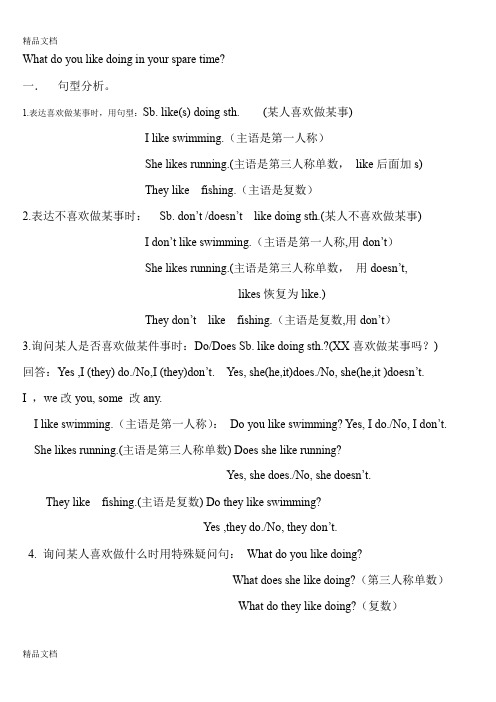
What do you like doing in your spare time?一.句型分析。
1.表达喜欢做某事时,用句型:Sb. like(s) doing sth. (某人喜欢做某事)I like swimming.(主语是第一人称)She likes running.(主语是第三人称单数,like后面加s)They like fishing.(主语是复数)2.表达不喜欢做某事时:Sb. don’t /doesn’t like doing sth.(某人不喜欢做某事)I don’t like swimming.(主语是第一人称,用don’t)She likes running.(主语是第三人称单数,用doesn’t,likes恢复为like.)They don’t like fishing.(主语是复数,用don’t)3.询问某人是否喜欢做某件事时:Do/Does Sb. like doing sth.?(XX喜欢做某事吗?) 回答:Yes ,I (they) do./No,I (they)don’t. Yes, she(he,it)does./No, she(he,it )doesn’t.I ,we改you, some 改any.I like swimming.(主语是第一人称):Do you like swimming? Yes, I do./No, I don’t. She likes running.(主语是第三人称单数) Does she like running?Yes, she does./No, she doesn’t.They like fishing.(主语是复数) Do they like swimming?Yes ,they do./No, they don’t.4. 询问某人喜欢做什么时用特殊疑问句:What do you like doing?What does she like doing?(第三人称单数)What do they like doing?(复数)一.填空。
香港朗文小学英语教材教学内容
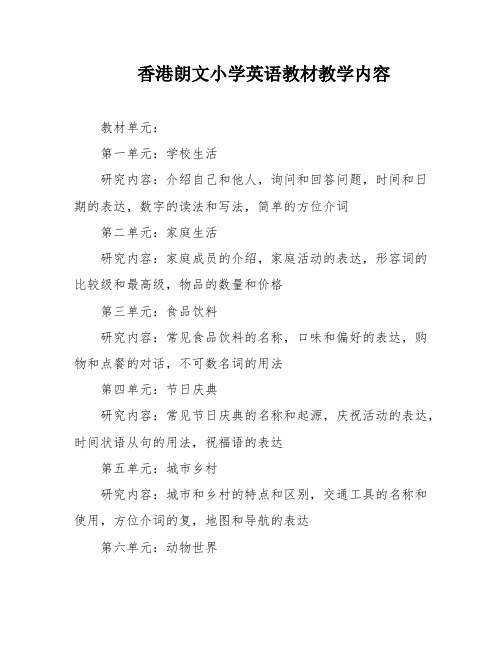
香港朗文小学英语教材教学内容教材单元:第一单元:学校生活研究内容:介绍自己和他人,询问和回答问题,时间和日期的表达,数字的读法和写法,简单的方位介词第二单元:家庭生活研究内容:家庭成员的介绍,家庭活动的表达,形容词的比较级和最高级,物品的数量和价格第三单元:食品饮料研究内容:常见食品饮料的名称,口味和偏好的表达,购物和点餐的对话,不可数名词的用法第四单元:节日庆典研究内容:常见节日庆典的名称和起源,庆祝活动的表达,时间状语从句的用法,祝福语的表达第五单元:城市乡村研究内容:城市和乡村的特点和区别,交通工具的名称和使用,方位介词的复,地图和导航的表达第六单元:动物世界研究内容:常见动物的名称和特征,动物分类和栖息地的介绍,形容词的修饰,比较句型的用法第七单元:自然环境研究内容:自然环境的描述和特点,天气和季节的表达,常见自然灾害的名称和预防措施,情态动词的用法教材单元:第一单元:研究内容:研究日常家务劳动的动词短语。
研究第三人称单数的一般疑问句和陈述句。
研究字母组合ay的发音。
研究表示行为规范的单词。
研究星期的全称和缩写形式。
研究字母组合th的清辅音发音。
研究交通工具名称。
研究用不同的特殊疑问词提问。
研究字母组合tr / dr的发音。
研究职业名称。
研究询问和表达家庭成员的职业。
研究字母组合th的浊辅音发音。
研究关于课外活动的动词短语。
研究询问和表达日常的活动安排。
研究字母组合cr / gr的发音。
研究一天中经历的不同活动的动词词组。
研究询问他人作息与活动的时间安排。
研究字母组合or的发音,并对比元音o的发音。
研究与季节和天气相关的形容词。
研究更多的衣物名称。
研究字母组合oa / ow的发音。
语法知识:研究一般现在时和现在进行时的区别。
第二单元:研究内容:研究第三人称单数的肯定句和否定句。
研究第三人称单数动词的变化规则。
复where / how / what等特殊疑词的用法。
区分介词on,in,by的用法。
(完整word版)香港朗文4A总结U1-U7
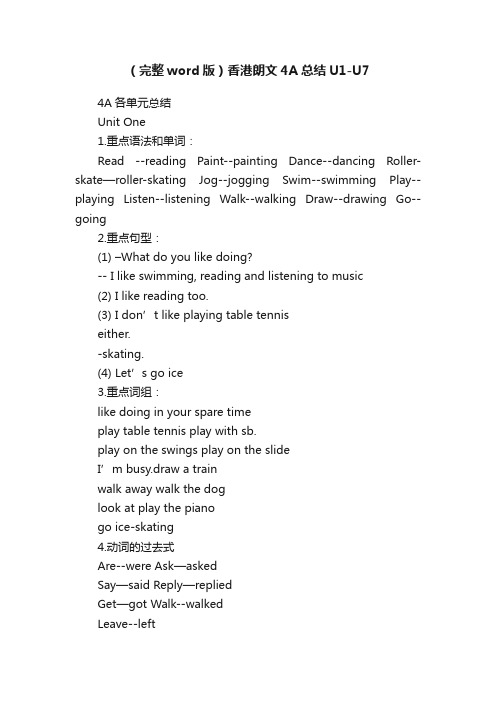
(完整word版)香港朗文4A总结U1-U74A各单元总结Unit One1.重点语法和单词:Read --reading Paint--painting Dance--dancing Roller-skate—roller-skating Jog--jogging Swim--swimming Play--playing Listen--listening Walk--walking Draw--drawing Go--going2.重点句型:(1) –What do you like doing?-- I like swimming, reading and listening to music(2) I like reading too.(3) I don’t like playing table tenniseither.-skating.(4) Let’s go ice3.重点词组:like doing in your spare timeplay table tennis play with sb.play on the swings play on the slideI’m busy.draw a trainwalk away walk the doglook at play the pianogo ice-skating4.动词的过去式Are--were Ask—askedSay—said Reply—repliedGet—got Walk--walkedLeave--leftGo—wentThink--thoughtUnit two1.重点语法和单词:Always Usually OftenSometimes Never2.重点句型:(1)--Do you ever tidy your room?-- Yes, I usually tidy my room.(2)—Does she ever play the violin?-- No, she never plays the violin.-- No, she doesn’t play the violin.3.重点词组:look after your pets go to bed earlytidy your room eat outget up late surf the Netget angry talk to sb.take photos invite sb. to one’s homeam/is/are good at something show one around look around go into the dining roomenjoy the meal play a lot of musicplay the recorder play the pianoplay the violin play a lot of sportplay pingpong play table tennisplay football watch football matches4.动词的过去式say—said talk—talkedcan—could ask--askedthink—thought show--showedhave—had call—calledwill--would enjoy--enjoyedspill—spilled/spilttake--tookgo--wentUnit Three1.重点语法:am/is/are--was are--were ask--asked like--likedfly--flew make--made flick--flicked want--wantedcatch--caught draw—drew stay--stayed happen--happened put--put say--said Play--playedhave/has--had hit--hitkeep--kept go--wentlose--lost do--didwin--won2.重点单词和词组:cola fast food CDscomics clocks air-consmobile-phones rickshaw an oil lampclogs camera fanstove play computer games fly kitesplay hopscotch make nets catch butterfliesplay marbles draw a circle on the groundgo out of the circle want to +动词原形flick the shooter into thecirclego out a lot of credit cardswear trainers have telephones check your answerask someone3.重点句型:(1)--Was there any cola when you were young?-Yes, there was.(2)The game I like best was marbles.(3)How do you play marbles?(4)– Did you wear trainers fifty years ago?--Yes, I did.(5)—Did you have a telephone?-- No, I didn’t. Rich people had telephones at home but poor people didn’t.(6 ) – Did you shop at the supermarket?--- No, I didn’t. There weren’t any supermarkets.(7) – Did you go to school?-- No, I didn’t. Rich children go to school but poor children didn’t.(8) –Did you listen to the radio?-- Yes, I did.Where(哪里)do you like going to in your holiday?How(如何)do you help at home?How much (多少钱,提问不可数名词)is it? --- It is five dollars.How many (多少,提问可数名词)books in your home?What time(什么时间)is it?What(什么)are you doing now? ----I am doing my homework.What(什么)is the weather like today? ----It’s windy.What color (什么颜色)is it? ---- It is red.What (什么)are you? ( What do you do?) -----I am a driver.When(什么时候)is your birthday? ---on 2nd MayHow old(多大)are you? ----I am ten.Who (谁) are you? -----I am David.Which(哪一个) club do you want to join?Why(为什么)do you like playing football?----Because I like being healthy.Unit Four1.重点单词和词组:cotton clothes silk clothes a horse a sedan chair silver and gold paper money a village a town do one’s homework feel sleepy after a while fall asleep strange friendly missWhy don’t you post office explain suddenly wake upcelebrate cook with firewood Ride horses Travel by sedan chair Chinese NewYearTravel by boat Send letters Rich people supermarket Cook with gasLook tired This is fun Live in flats Keep in touch with Be away fromhome2.动词过去式:wear—wore ride—rode travel—travelled walk—walked feel—felt take—took miss—missed write—wrote explain—explained wake—woke3.重点句型(1)How did people travel?——Most/Rich/Some people travelled by boat/sedan chair.(2)What did people wear?——Most/Rich people wore cotton clothes/silk clothes.(3)May I use your phone?(4)Why don’t you+动词原形(5)How do you want to send your letter?——By...... .(6)Were there any supermarkets?——No,there weren’t.Unit Five:1.重点单词词组science museum a horse a camel a giraffe an owla peacock an eagle a hippo leader come forwardwise look after talk about eel sharkdolphin starfish crab come down breakdirection scary feather noisy hairy tiny wolf crocodile penguin parrotbee fly cockroach shiny silver2.单词过去式meet—met come—came say—said speak—spoke catch—caughtswim—swam shout—shouted break—broke save—saved3.形容词比较级最高级Tall-taller-tallest Heavy-heavier-heaviestBig-bigger-biggest Small-smaller-smallest Pretty-prettier-prettiestFast-faster-fastest Strong-stronger-strongestGood-better-best Long-longer-longest4.重点句型(1)The horse, the camel and the giraffe are tall.The camel is taller than the horse.The giraffe is the tallest.(2)I’m stronger than all of you.Unit Six:1.重点单词和词组villages islands temples crocodiles snakesa boat trip a camel trip a helicopter trip a waterfall a rivera cave at the beach proud powerful show offshow sb around country politely an hour a thick jungle different plant huge later fly overmountain dangerous fantastic too tired at the beginningof restaurant activity enjoyable exciting wonderful2.形容词比较级最高级interesting-more interesting-the most interesting exciting-more exciting-themost excitingpowerful-more powerful-themost powerfulbeautiful-more beautiful-the most beautifuldangerous-more dangerous-the most dangeroushigh-higher-highest nice-nicer-nicest wide-wider-widest light-lighter-lightest3.重点句型(1)We visited some interesting places.The villages were more interesting than the temples.The islands were the most interesting.(2)Let me show you around my country.Let sb +do(动词原形)(3)Isn’t it big?——Yes, it’s huge.(4)Are we near your home yet?——Oh,no.It’s still a long way away.Unit Seven1.单词词组汇总learn a lesson character list forest insect busyquickly slowly work hard collect build a newhomebright light up path naughty loudlysoftly match carefully careless Don’t worry drop burn down be afraid of warn Look out get away speak angrily steal dirty rubbish bin clean up stranger fly off2.过去式light—lighted(lit)drop—dropped burn—burned steal—stole fly—flew happen—happenedstart—started try—tried get—got3.重点句型(1)The insects are busy today,aren’t they?——Yes,they are.(2)What are they?——They are......(3)Did you steal the matches?——Yes,I did.(4)Why did you fly off with the burning match?——Because I.......。
朗文英语4A 重点单词句型

Sentences:What do you like doing in your spare time? What do you like doing when you’re free?I like roller-skating, painting and reading. She doesn’t like reading or singing.They can play chess.你业余时间喜欢做什么?你业余时间喜欢做什么?我喜欢溜冰、绘画和阅读。
她不喜欢读书或唱歌。
他们可以下棋。
Sentences:Do you ever tidy your room? Yes, I usually tidy my room. Does he ever surfer the Net? No, he never surfs the Net.This is my best friend, Ken.He likes playing sport.He plays a lot of sport every week. 你曾经整理你的房间吗?是的,我通常整理房间。
他曾经上网吗?不,他从不上网。
这是我最好的朋友,肯。
他喜欢运动。
他每周运动一次。
Sentences:Was there any fast food when you were young, Grandma? Yes, there was.No, there wasn’t.Were there any comics when you were young, Grandpa?Yes, there were.No, there weren’t.Did you were trainers fifty years ago?Yes, I did.No, I didn’t. Rich people had telephones at home but poor people didn’t.当你(您)年轻时有什么快餐,奶奶?是的,有。
- 1、下载文档前请自行甄别文档内容的完整性,平台不提供额外的编辑、内容补充、找答案等附加服务。
- 2、"仅部分预览"的文档,不可在线预览部分如存在完整性等问题,可反馈申请退款(可完整预览的文档不适用该条件!)。
- 3、如文档侵犯您的权益,请联系客服反馈,我们会尽快为您处理(人工客服工作时间:9:00-18:30)。
Knowing our friends
一.句型分析。
1.表达喜欢做某事时,用句型:
Sb. like(s) doing sth. (某人喜欢做某事)
I like swimming.(主语是第一人称)
She likes running.(主语是第三人称单数, like后面加s)
They like fishing.(主语是复数)
2.表达不喜欢做某事
时: Sb. don’t/doesn’t like doing sth.(某人不喜欢做某事)
I don’t like swimming.(主语是第一人称,用don’t)
She likes running.(主语是第三人称单数,用doesn’t, likes恢复为like.)
They don’t like fishing.(主语是复数, 用don’t)
3.询问某人是否喜欢做某件事时:
Do/Does Sb. like doing sth.?(XX喜欢做某事吗?)
回答:
Yes ,I (they) do./No,I (they)don’t.
Yes, she(he,it)does./No, she(he,it )do esn’t.
I ,we改you, some 改any.
I like swimming.(主语是第一人
称): Do you like swimming?
Yes, I do./No, I don’t.
She likes running.(主语是第三人称单
数) Does she like running?
Yes, she does./No, she doesn’t.
They like fishing.(主语是复
数) Do they like swimming?
Yes ,they do./No, they don’t.
4. 询问某人喜欢做什么时用特殊疑问句:What do you like doing?
What does she like doing?(第三人称单数)What do they like doing?(复数)
More about our friends
1. 知识点分析。
ever never sometimes often usually
always的区分:
ever 曾经,表示经历过某事。
I ever surf the Net.
Do you ever look after your pets?你照顾过你的宠物吗?
never 从来不表示从来没有做过某件事。
I never go to Beijing.我从来没有去过北
京。
She never eats out.她从不出去吃饭。
sometimes 有时候表示做过某事,但次数不多。
★-★★
I sometimes get up late. 我有时候起得晚。
(很少)
often 经常表示做过某事,次数较多,但
比 usually 少。
★★★-★★★★
I often go to bed late. 我经常很晚睡觉。
usually 通常表示经常做某事。
(基本形成习惯)★★★★★--★★★★★★
I usually get up early.(我基本上都是早起,很少晚起)
always 一直表示某件事情已经成为习惯,每天都在做。
★★★★★★★
I always et up early.(我一直起得早,没起晚过)
句型:
1. 你曾经………吗?
Do you ever …..? Yes, I do./ No, I don’t.
2. XX曾经……吗?
Does Jenny ever ……? Yes, she does./No.she doesn’t.
一.填空。
I like __________.(读书)
I ___________like ___________(画画) Ken likes __________(唱
歌), He _________like __________(跳舞) They like ________(滑
冰), They _________like_____________(跑步)
Do you like ____________(听音乐)?
Yes ,___________ Does Mary like _____ _______(下棋)?
No ,___________.
Do Jenny and Ben like____________(外出吃饭)?
No, _________.
二.中译英A
1. 我喜欢游泳和溜冰,你喜欢干什么?
2. Tim和Kate 喜欢打乒乓球。
3. 你喜欢看书吗?喜欢。
我也喜欢。
4. 你业余时间喜欢干什么?我喜欢下棋。
5. 我们去滑冰吧。
6. Ben 喜欢唱歌,Jack也喜欢唱歌,他们可以一起唱歌。
7. 我们有空的时间喜欢跑步,我们觉得它很有趣。
中译英B
1. 我经常和朋友去外面玩。
2. Tom 和Betty有时候一起做作业。
3. 他们通常七点去上学。
4. Judy 从不上网。
